|
|
|
Sort Order |
|
|
|
Items / Page
|
|
|
|
|
|
|
| Srl | Item |
| 1 |
ID:
133778
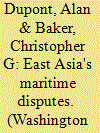

|
|
|
|
|
| Publication |
2014.
|
| Summary/Abstract |
Few doubt that China's rise is this era's principal driver of strategic change, just as the United States' equally influential ascendancy shaped the last. But earlier optimism that the Middle Kingdom's re-emergence as a major power would be largely benign is fading as evidence mounts that Beijing is determined to press its territorial and resource claims in the vitally important seas of the Western Pacific. In barely the blink of a geopolitical eye, China's once lauded charm offensive has given way to exactly the kind of coercive behavior its critics have long predicted.1 In a 3,000-mile maritime arc running from the East China Sea to the southern reaches of the South China Sea, Beijing is at loggerheads with many of its neighbors, including erstwhile friends, over several linked territorial and resource disputes. If not wisely managed, these disputes could bring East Asia's long peace to a premature and bloody end.
|
|
|
|
|
|
|
|
|
|
|
|
|
|
|
|
| 2 |
ID:
154722
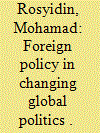

|
|
|
|
|
| Summary/Abstract |
Since President Jokowi came to power in October 2014, Indonesia’s foreign policy has undergone fundamental change, most obviously in the state’s emphasis on domestic priorities rather than global engagement. Although Jokowi’s foreign policy has pursued an ‘active’ principle by participating in many international forums, it seems to have overlooked the changing contexts of the geopolitical turn. Asia has been rising and is becoming the geopolitical center of gravity in the 21st century. Yet, instead of adapting to this shift, Indonesia’s foreign policy continues to neglect the ‘Asian Century’ turn that has been taking place for years. Indonesia should have increased its international profile to enhance its status as a ‘Third Asian Giant’ beside China and India, but Jokowi’s administration has not taken such an opportunity. This article argues that Indonesia is not interested in gaining international status because of the domestically focused nature of its foreign policy. Indonesia is seen as needing to consolidate its own national resilience before asserting itself in a wider international arena. For Jokowi, national interest is defined as material—primarily economic—interest. In addition, Indonesia’s traditional status as a regional, middle level international power prevents the country from seeking any greater global status. This article argues, with optimism, that Indonesia should seek to change this traditional paradigm of middle power status. It suggests that the assertion of global status matters in Indonesia’s foreign policy because the better the country’s position in the international hierarchy of states, the easier it will be for the nation to achieve its own domestic interests.
|
|
|
|
|
|
|
|
|
|
|
|
|
|
|
|
| 3 |
ID:
133842
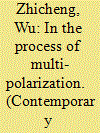

|
|
|
|
|
| Publication |
2014.
|
| Summary/Abstract |
The international system is the relatively stable framework of international relations constituted by various international actors, and represented by the great powers. The various international actors interact with one another in the framework. Therefore, against the current background of deepended globalization.
|
|
|
|
|
|
|
|
|
|
|
|
|
|
|
|
| 4 |
ID:
111675
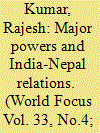

|
|
|
| 5 |
ID:
167696
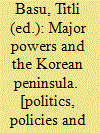

|
|
|
|
|
| Publication |
New Delhi, KW Publishers Pvt Ltd, 2019.
|
| Description |
xvii, 371p.hbk
|
| Series |
East Asia Strategic Review
|
| Standard Number |
9789389137156
|
|
|
|
|
|
|
|
|
|
|
|
Copies: C:2/I:0,R:0,Q:0
Circulation
| Accession# | Call# | Current Location | Status | Policy | Location |
| 059702 | 320.519/BAS 059702 | Main | On Shelf | General | |
| 059703 | 320.519/BAS 059703 | Main | On Shelf | General | |
|
|
|
|
| 6 |
ID:
133847
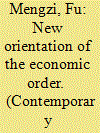

|
|
|
|
|
| Publication |
2014.
|
| Summary/Abstract |
In general, any regional order or international order depends on the strategies of major powers. The order arises because power have chosen it while it is passively accepted by other parties. International orders are relatively stable. The current international order under the UN framework as the principal axis was formed after the Second World War. Our principles of peace and development have been set within it, and the behavior and legal norms of sovereign nations within international relations are meant to comply with it.
|
|
|
|
|
|
|
|
|
|
|
|
|
|
|
|
| 7 |
ID:
133815
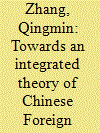

|
|
|
|
|
| Publication |
2014.
|
| Summary/Abstract |
This article tries to integrate the theories of personality type and Chinese foreign policy studies. It finds that theories of personality offer a new perspective on the study of Chinese foreign policy and help to better explain the differences in China's foreign policy under Mao Zedong and Deng Xiaoping, including their international orientation, the main themes of China's foreign policy during their respective times in office, their policies towards the major powers, as well as those towards small countries. Theoretically, such integration contributes to the development of a more general theory of foreign policy analysis that would travel better beyond the borders of the American case. Empirically it highlights the necessity and benefit of an integrated approach bringing leadership personality back into the center of the analysis while taking into account other levels of analysis in the study of Chinese foreign policy.
|
|
|
|
|
|
|
|
|
|
|
|
|
|
|
|
| 8 |
ID:
132402
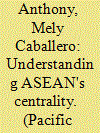

|
|
|
|
|
| Publication |
2014.
|
| Summary/Abstract |
There have been a number of articles about ASEAN's centrality in the regional security architecture of Asia. Yet, the notion of centrality remains undefined and under-operationalised. Implicit in the discourses of centrality is the idea of ASEAN's leadership, which in turn raises questions about ASEAN's ability to do so, given its limited capacity. This article defines ASEAN's centrality from the perspective of social network approach and argues that ASEAN's structural position in the density of networks that it has established and those that it has linkages with explains ASEAN's centrality. Despite its lack of material power, ASEAN has been able to claim centrality because of its position as a node in a cluster of networks, and this condition of 'high betweenness' allows ASEAN to exercise influence in regional processes with the tacit acceptance of major powers. However, while centrality may have been achieved, maintaining centrality in a rapidly changing regional environment compels ASEAN to address challenges to its centrality. This would necessarily include its ability to maintain consensus, carry out collective action and achieve its stated goals.
|
|
|
|
|
|
|
|
|
|
|
|
|
|
|
|
|
|
|
|
|